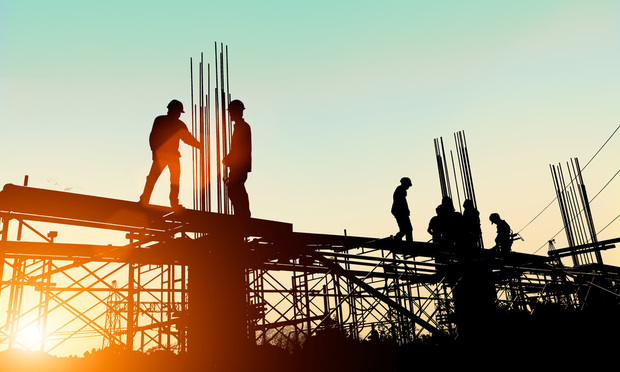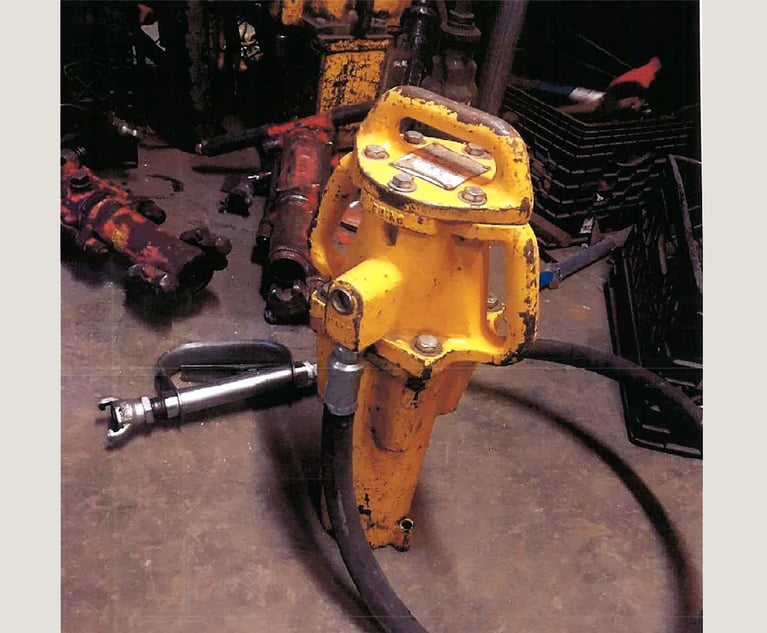How Policymakers Can Combat New York's Construction Safety Crisis
These protections are already making a difference. A report published earlier this year found that fatal constructions incidents in New York City have declined 23% over the last five years while increasing by 39% across the rest of the state in the same timeframe.
April 29, 2019 at 09:59 AM
4 minute read
 Held each year on April 28, Workers Memorial Day provides an opportunity to pay tribute to the thousands of Americans who lose their lives on the job each year. But beyond honoring the working men and women who tragically lost their lives, this day of remembrance serves as a reminder of the critical need to prioritize occupational safety and protect the individuals who keep our economy moving.
Held each year on April 28, Workers Memorial Day provides an opportunity to pay tribute to the thousands of Americans who lose their lives on the job each year. But beyond honoring the working men and women who tragically lost their lives, this day of remembrance serves as a reminder of the critical need to prioritize occupational safety and protect the individuals who keep our economy moving.
There is a particularly crucial need to reinforce safety protections for individuals working within industries that present heightened occupational risks. Here in New York, construction workers across the state experience on-the-job deaths and serious injuries at an astonishingly high rate, exemplified by a string of fatal incidents earlier this month. And yet, despite the clear need for stronger regulatory enforcement and controls, business interests are spending millions of dollars on misinformation campaigns to weaken and derail legislative safeguards for construction workers.
Labor protections are effective when backed by adequate resources and meaningful regulatory enforcement. The most recent available data indicates that construction safety guidelines have delivered results when they are properly prioritized by public officials.
In New York City, policymakers have raised funding for the Department of Buildings from $107 million in 2015 to $183 million in 2019, allowing the agency to increase its staff by more than 700 employees and conduct a greater number of worksite inspections. Officials have also implemented measures designed to improve safety knowledge with required worksite training and safety certifications. The city's efforts to improve construction safety were bolstered by the Manhattan District Attorney office's enforcement of criminal penalties through the Construction Fraud Task Force.
These protections are already making a difference. A report published earlier this year found that fatal constructions incidents in New York City have declined 23% over the last five years while increasing by 39% across the rest of the state in the same timeframe. That's not to say that we've reached 'Mission Accomplished' for construction safety in New York City-the heartbreaking deaths of three individuals at separate NYC worksites demonstrate that we need to be doing more to protect our workers. However, the overall drop in fatal and injurious incidents show that proactive policymaking and enforcement will be central to fostering a safer environment for workers.
State policymakers must similarly devote greater resources to safety inspections and agency staffing. It is also critical that lawmakers uphold the Scaffold Safety Law, and resist attempts by business interests to weaken it on the basis of false characterizations and unsubstantiated claims. When you cut through the political noise, the Scaffold Safety Law is quite straightforward in practice. The statute merely requires contractors to provide the necessary safety equipment to workers. In the event that proper safety equipment isn't provided and injury results, workers and their families are able to hold the negligent parties accountable for medical expenses and lost wages.
We've seen that stronger regulations can significantly improve worksite safety. The Scaffold Safety Law is one of the few ways that New York construction workers and their families can hold negligent contractors accountable. Repealing or weakening the law would further incentivize contractors to grow their profits by cutting corners on safety, placing workers in even greater danger than they are already in. Elected officials must refrain from taking business groups' misleading claims at face value, and prioritize worker safety ahead of construction profits.
Policymakers across New York should also further emphasize transparency by establishing mechanisms to expand the enforcement of existing labor rules. Public databases that identify bad actors and labor transgressions would provide an additional layer of scrutiny that would encourage a stronger commitment to worker safety. The state should also pass Carlos' Law, a bill that would raise the maximum fines for safety violations and implement safety training requirements that have proven successful in New York City.
On Worker Memorial Day, we will grieve with the friends and families of those who have lost their lives while simply trying to make a living. We can help honor their memories by doing everything we can to make New York a safer place and put our workers' well-being first.
David Oddo is the president of the New York State Trial Lawyers Association. Mario Cilento is the president of the New York State AFL-CIO.
This content has been archived. It is available through our partners, LexisNexis® and Bloomberg Law.
To view this content, please continue to their sites.
Not a Lexis Subscriber?
Subscribe Now
Not a Bloomberg Law Subscriber?
Subscribe Now
NOT FOR REPRINT
© 2025 ALM Global, LLC, All Rights Reserved. Request academic re-use from www.copyright.com. All other uses, submit a request to [email protected]. For more information visit Asset & Logo Licensing.
You Might Like
View All
Decision of the Day: Court Holds Accident with Post Driver Was 'Bizarre Occurrence,' Dismisses Action Brought Under Labor Law §240

Cleary vs. White & Case: NY Showdown Over $5 Billion Brazilian Bankruptcy


Trending Stories
- 1Public Notices/Calendars
- 2Wednesday Newspaper
- 3Decision of the Day: Qui Tam Relators Do Not Plausibly Claim Firm Avoided Tax Obligations Through Visa Applications, Circuit Finds
- 4Judicial Ethics Opinion 24-116
- 5Big Law Firms Sheppard Mullin, Morgan Lewis and Baker Botts Add Partners in Houston
Who Got The Work
J. Brugh Lower of Gibbons has entered an appearance for industrial equipment supplier Devco Corporation in a pending trademark infringement lawsuit. The suit, accusing the defendant of selling knock-off Graco products, was filed Dec. 18 in New Jersey District Court by Rivkin Radler on behalf of Graco Inc. and Graco Minnesota. The case, assigned to U.S. District Judge Zahid N. Quraishi, is 3:24-cv-11294, Graco Inc. et al v. Devco Corporation.
Who Got The Work
Rebecca Maller-Stein and Kent A. Yalowitz of Arnold & Porter Kaye Scholer have entered their appearances for Hanaco Venture Capital and its executives, Lior Prosor and David Frankel, in a pending securities lawsuit. The action, filed on Dec. 24 in New York Southern District Court by Zell, Aron & Co. on behalf of Goldeneye Advisors, accuses the defendants of negligently and fraudulently managing the plaintiff's $1 million investment. The case, assigned to U.S. District Judge Vernon S. Broderick, is 1:24-cv-09918, Goldeneye Advisors, LLC v. Hanaco Venture Capital, Ltd. et al.
Who Got The Work
Attorneys from A&O Shearman has stepped in as defense counsel for Toronto-Dominion Bank and other defendants in a pending securities class action. The suit, filed Dec. 11 in New York Southern District Court by Bleichmar Fonti & Auld, accuses the defendants of concealing the bank's 'pervasive' deficiencies in regards to its compliance with the Bank Secrecy Act and the quality of its anti-money laundering controls. The case, assigned to U.S. District Judge Arun Subramanian, is 1:24-cv-09445, Gonzalez v. The Toronto-Dominion Bank et al.
Who Got The Work
Crown Castle International, a Pennsylvania company providing shared communications infrastructure, has turned to Luke D. Wolf of Gordon Rees Scully Mansukhani to fend off a pending breach-of-contract lawsuit. The court action, filed Nov. 25 in Michigan Eastern District Court by Hooper Hathaway PC on behalf of The Town Residences LLC, accuses Crown Castle of failing to transfer approximately $30,000 in utility payments from T-Mobile in breach of a roof-top lease and assignment agreement. The case, assigned to U.S. District Judge Susan K. Declercq, is 2:24-cv-13131, The Town Residences LLC v. T-Mobile US, Inc. et al.
Who Got The Work
Wilfred P. Coronato and Daniel M. Schwartz of McCarter & English have stepped in as defense counsel to Electrolux Home Products Inc. in a pending product liability lawsuit. The court action, filed Nov. 26 in New York Eastern District Court by Poulos Lopiccolo PC and Nagel Rice LLP on behalf of David Stern, alleges that the defendant's refrigerators’ drawers and shelving repeatedly break and fall apart within months after purchase. The case, assigned to U.S. District Judge Joan M. Azrack, is 2:24-cv-08204, Stern v. Electrolux Home Products, Inc.
Featured Firms
Law Offices of Gary Martin Hays & Associates, P.C.
(470) 294-1674
Law Offices of Mark E. Salomone
(857) 444-6468
Smith & Hassler
(713) 739-1250






